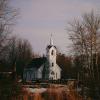
I wrote earlier in the week that I wanted to say more about this refrain the second time around, and we come to it the second time now. It is a great testimony, of course ("O my Strength, I sing praise to you; you, O God, are my fortress, my loving God"), particularly when we remember that outwardly the psalmist's circumstances had not changed a bit. The same situation that caused David to cry out to God in verses 1 and 2 are still there. But here at the very end he is not only testifying that God is his strength and his fortress. He is actually singing praises to God in the very midst of his danger. In fact, the singing begins even a verse before this, in verse 16.

In the psalmist's first appeal (vv. 1-5), the emphasis seemed to be on David's danger and therefore on the bloodthirsty men who had been set against him. In this second parallel appeal (vv. 10-13), David's description of the danger shifts to what he is asking God to do to these enemies.

Most people who live in the West today have little appreciation for the role of the numerous wild dogs of an ancient eastern city. For us, dogs are pets for the most part, or at least guard dogs that patrol an area but are not allowed to roam wild. It was not like that in the East. Occasionally people may have had small dogs as pets. Jesus’ words to the Canaanite woman seems to imply this: "It is not right to take the children's bread and toss it to their dogs" (Matt. 15:26). But generally the dogs of an Eastern city were wild scavengers which roamed in packs, particularly at night when they searched the streets and alleys for garbage or other food that may have been discarded by the citizens.

From where we sit, in safety and comfort, and frequently surrounded by luxuries, the psalms sometimes seem to be little more than quaint poetry containing noble thoughts. We lose a feel for their urgency. Yet the psalms are often very urgent and their prayers almost desperate. We catch something of the urgent quality of this psalm in the imperatives that begin each of the four swift sentence prayers of verses 1 and 2: "deliver", "protect,” “deliver” and "save.” These are not casual utterances. In them we can sense David's awareness of danger and of his desperate aloneness except for God.

Psalm 59 is another psalm with an historical setting from the life of David, the great poet of the first two books of psalms. These historically-based psalms have appeared in more or less alternating order since Psalm 51. That is, when we look at the titles to these psalms, we find historical references for Psalms 51, 52,54,56, 57, and now 59 and 60. Most of these are linked to the days when David was hiding from King Saul, first at Nob, then at Gath, next in the wilderness of Ziph and finally in the wilderness cave of Adullam. As the collection comes to an end, we find Psalm 60 looking ahead to something that happened later in David's life when he had been king for some time, and Psalm 59, which we are to study now, looking back to David's first troubles with the king.


















